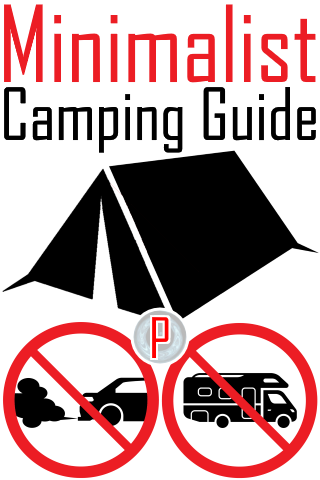
You may be asking yourself, what exactly is minimalist camping and how does it differ from just plain old camping?
While camping is about living off just the essentials, allowing you to get back to nature and explore far and wide by carrying everything that you need with you, anyone who has visited a camping store recently will know that in this day and age, there is a camping version of pretty much everything you have in your home, including the kitchen sink!
Minimalist camping is about carrying just the bare essentials, no coffee maker, no electric blanket, no space heater, so you can enjoy your time carrying as little weight as possible. What you don’t have with you in terms of equipment, you need to compensate for with knowledge, skill and ingenuity, and you may just need to live with a little discomfort. With that in mind, before embarking on a minimalist camping trip, do ask yourself if minimalist camping is for you!
Preparing for a minimalist camping trip can be harder than regular camping, as while you may be packing less, you need to be sure that you do have the basics, as you are unlikely to have a backup.
Here are a few things to think about when preparing for a minimalist camping trip.
Backpack
In general, if you are taking a minimal approach to camping you should have a ‘one backpack per person’ rule. And that backpack can’t be so heavy that the person can’t carry it for more than 5 minutes without needing a break. To help with that you should make sure you choose an ergonomic backpack with good weight distribution straps to make carrying it as comfortable as possible.
It is also a good idea to grab a back with lots of different compartments to organize your stuff, or use packing organizers. Everything will be stored in one place, and you don’t want to be unpacking and repacking your bag every time you need to retrieve something.
We are currently using the Venture Pal Lightweight Backpack and the Loowoko 50L.
Tent and Sleeping Bags
Depending on where you are going camping, you may feel like you can go without a tent and just use a tarpaulin to create the shelter you need, but in most cases, you will probably want a tent.
Luckily there are a lot of tents on the market that are lightweight and fold down to incredibly small sizes for carrying. You don’t need a luxury tent, but do make sure you get a tent that is big enough – no one likes to feel like they are sleeping in a coffin, and don’t forget that you may need to pass some time sitting inside the tent if the weather turns bad. Choosing a tent doesn’t mean that you can forget your tarpaulin, as you may need it to protect the bottom of your tent from the elements, both to avoid ruining your tent and prevent water seeping inside.
Weighing about 4 lbs the TNH two person tent is a great option, and if you are looking for something a bit bigger the Winterial 3 person tent is similarly light, compact and easy to carry.
A good quality sleeping bag that is warm, lightweight and folds down small is also worth the investment. I like the Winner Outfitters camping sleeping bag or the Outdoor Vitals Summit Premium Down sleeping bag.
A sleeping pad might sound like a luxury, but it is an essential. Sleeping directly on the ground sucks the heat out of your body, reducing the effectiveness of the warmest sleeping bag. Also, we all know how poorly we function without a good night’s sleep, and how hard it can be to sleep on lumpy ground. When you have a full day hike ahead of you with a weighty backpack, you’ll be thankful for the extra sleep you got thanks to a sleeping pad. Weighing just 1 lbs you’ll barely notice that you are carrying the EKOTEK inflatable sleeping pad.
Clothes and Toiletries
Clothes should be one of the first things you minimize on your packing list. If you are only going for a long weekend consider just taking the clothes that you have on your back, plus some spare socks – there is nothing more uncomfortable than wet feet, or more necessary than a change of socks if blisters start forming. Wear layers to adjust for the temperature, and get comfortable with the idea that you may not smell your best for a few days.
Do pack a raincoat, something lightweight that you can throw over the top of everything, like this multipurpose Homegrace Rain Poncho. You don’t want to be caught in the situation where your clothes, pack and sleeping bag are all wet and you just can’t dry it out. This is inconvenient, uncomfortable, and in the wrong conditions, dangerous.
You can also be minimalist with your toiletries. While you can probably feel relatively OK with not washing your hair for a week, brushing your teeth probably feels like a daily essential. Bring your toothbrush, toothpaste and deodorant, and some soap in case something happens and you get really dirty.
And don’t forget your biodegradable toilet paper and toilet shovel. Minimalist camping doesn’t give you the excuse to forget basic camping etiquette.
Water and Food
Water is one of the heaviest things you carry while camping, so make sure you don’t need to carry your entire water supply with you. Get a personal water filter which will enable you to use the local water supply. The LifeStraw is the most popular personal water filter on the market at the moment as it filters more than 99% of bacteria, and is small and lightweight. Just remember that it is not effective with salt water. Also remember to carry a reasonably sized stainless steel water bottle in order to carry water away with you.
What food you carry will very much depend on you, how long you will be away, and where you will be going. Will you be in an area with lots of opportunities to buy (or if you are so inclined catch) food, or will you need to bring everything with you?
If you need to carry a lot of food, do invest in lightweight food that is high in calories and energy like energy bars, trail mix and jerky. This food isn’t satisfying, but it will keep you going. You will probably want to plan at least one substantial meal per day, but be conscious of what you can live without. You don’t need to carry your entire spice rack with you. You can probably get by with salt and cooking oil.
Take a simple camp stove (or indeed try cooking over an open fire), as well as one or two pots and pans, tongs or some other kind of universal cooking utensil, and a mess kit for everyone in the group.
Other Essentials
If you are planning on cooking, fire is a must, so bring waterproof matches or a lighter in a waterproof case. You can be creative with your kindling; tea bags are a surprisingly effective option.
Do make sure you have a flashlight for everyone in the group. Headlamps are a great option as everyone can work hands free and it is easy to keep track of where everyone is.
Your first aid kit is not negotiable, as the unexpected can always happen. Make sure you also bring insect repellent, sunscreen, essential medicines, rope and a knife. Divided between your party, these essentials should barely make a difference to each camper’s individual load.
The other thing to remember is that as well as preparing your equipment, you need to prepare yourself. Minimalist camping does mean roughing it, sometimes suffering discomfort and sometimes going without. Prepare yourself mentally for the experience and think of it as an adventure rather than a problem.
Minimalist camping also means often relying on your environment for what you need, so make sure you educate yourself. Do you know where the best water sources in the area are and have you planned a hike that brings you close to the water regularly? Do you know the local wildlife and what is safe to eat and what should be avoided? Minimalist camping is responsible camping, so make sure you take the time to educate yourself on the essentials before your venture out.


